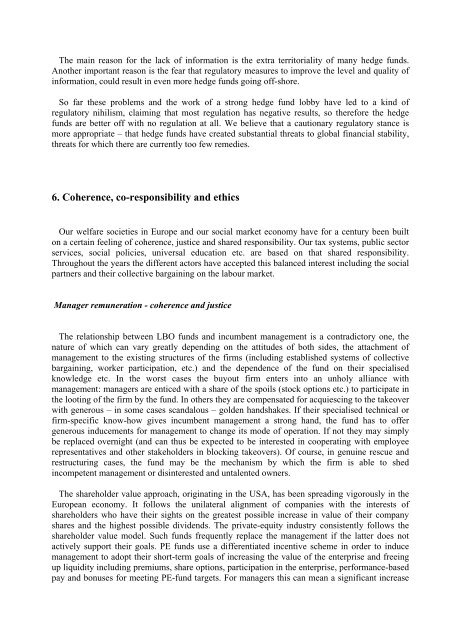Executive summary - Udo Bullmann
Executive summary - Udo Bullmann
Executive summary - Udo Bullmann
- No tags were found...
You also want an ePaper? Increase the reach of your titles
YUMPU automatically turns print PDFs into web optimized ePapers that Google loves.
The main reason for the lack of information is the extra territoriality of many hedge funds.Another important reason is the fear that regulatory measures to improve the level and quality ofinformation, could result in even more hedge funds going off-shore.So far these problems and the work of a strong hedge fund lobby have led to a kind ofregulatory nihilism, claiming that most regulation has negative results, so therefore the hedgefunds are better off with no regulation at all. We believe that a cautionary regulatory stance ismore appropriate – that hedge funds have created substantial threats to global financial stability,threats for which there are currently too few remedies.6. Coherence, co-responsibility and ethicsOur welfare societies in Europe and our social market economy have for a century been builton a certain feeling of coherence, justice and shared responsibility. Our tax systems, public sectorservices, social policies, universal education etc. are based on that shared responsibility.Throughout the years the different actors have accepted this balanced interest including the socialpartners and their collective bargaining on the labour market.Manager remuneration - coherence and justiceThe relationship between LBO funds and incumbent management is a contradictory one, thenature of which can vary greatly depending on the attitudes of both sides, the attachment ofmanagement to the existing structures of the firms (including established systems of collectivebargaining, worker participation, etc.) and the dependence of the fund on their specialisedknowledge etc. In the worst cases the buyout firm enters into an unholy alliance withmanagement: managers are enticed with a share of the spoils (stock options etc.) to participate inthe looting of the firm by the fund. In others they are compensated for acquiescing to the takeoverwith generous – in some cases scandalous – golden handshakes. If their specialised technical orfirm-specific know-how gives incumbent management a strong hand, the fund has to offergenerous inducements for management to change its mode of operation. If not they may simplybe replaced overnight (and can thus be expected to be interested in cooperating with employeerepresentatives and other stakeholders in blocking takeovers). Of course, in genuine rescue andrestructuring cases, the fund may be the mechanism by which the firm is able to shedincompetent management or disinterested and untalented owners.The shareholder value approach, originating in the USA, has been spreading vigorously in theEuropean economy. It follows the unilateral alignment of companies with the interests ofshareholders who have their sights on the greatest possible increase in value of their companyshares and the highest possible dividends. The private-equity industry consistently follows theshareholder value model. Such funds frequently replace the management if the latter does notactively support their goals. PE funds use a differentiated incentive scheme in order to inducemanagement to adopt their short-term goals of increasing the value of the enterprise and freeingup liquidity including premiums, share options, participation in the enterprise, performance-basedpay and bonuses for meeting PE-fund targets. For managers this can mean a significant increase





